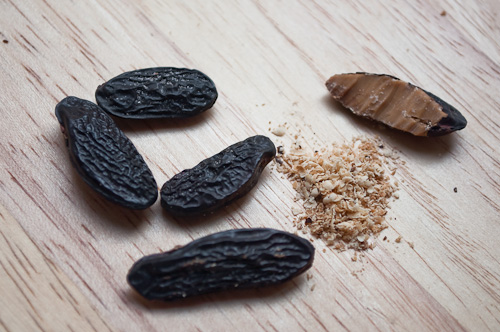Title: Tonka Bean (Dipteryx odorata) Materia Medica
Disclaimer: This Materia Medica is provided for informational purposes only and should not replace professional medical advice. Please consult with a qualified healthcare practitioner or herbalist before using any herbal remedies.
Introduction: Tonka beans, scientifically known as Dipteryx odorata, are seeds derived from the Tonka tree native to South America. These beans have a long history of traditional use in herbal medicine and culinary applications. As a professional herbalist, it’s essential to understand the properties, benefits, and potential risks associated with tonka beans. This comprehensive Materia Medica aims to provide a detailed perspective on the uses, preparations, and safety considerations of tonka beans.
Botanical Description:
- Scientific Name: Dipteryx odorata
- Common Names: Tonka bean, Tonquin bean, Cumaru
- Family: Fabaceae (Legume family)
- Habitat: Native to South America, primarily found in countries like Brazil, Venezuela, and Colombia.
Part Used: Tonka beans are the seeds of the Tonka tree and are the primary part used in herbal medicine and culinary practices.
Constituents: Tonka beans contain a variety of chemical constituents, including coumarin, coumarinic compounds, and essential oils. Coumarin is the compound responsible for its distinctive aroma and flavor.
Traditional Uses:
- Aromatic:
- Tonka beans are prized for their sweet, vanilla-like fragrance and are used in perfumery and aromatherapy to create warm and comforting scents.
- Culinary:
- In cooking, tonka beans are employed as a natural flavoring agent, imparting a unique vanilla and almond-like flavor to dishes, desserts, and beverages.
- However, the use of tonka beans in food has raised concerns due to their coumarin content, which can be toxic in large quantities. Thus, they are banned in some countries for culinary use.
- Digestive Aid:
- Tonka beans have been traditionally used as a digestive aid and to alleviate minor gastrointestinal discomfort.
- Relaxant and Sleep Aid:
- Infusions or tinctures made from tonka beans have been used to promote relaxation and assist with sleep, owing to their mild sedative properties.
- Anti-inflammatory:
- Topical applications of tonka bean preparations have been used for their potential anti-inflammatory effects in treating minor skin irritations.
Preparations and Dosage:
- Infusion:
- To prepare a tonka bean infusion, use 1-2 crushed beans in 8 ounces of hot water. Steep for 10-15 minutes and drink as a calming tea.
- Tincture:
- Tinctures can be made using crushed tonka beans and alcohol. The recommended dosage is generally 1-2 ml (20-40 drops) up to three times per day.
- External Use:
- Tonka bean-infused oils or creams may be applied topically for minor skin irritations or as a massage oil.
Safety Considerations:
- Coumarin Content:
- Tonka beans contain coumarin, which can be toxic in high doses. As such, it is essential to use tonka beans sparingly and in moderation.
- Some countries have banned tonka beans for culinary use due to concerns about coumarin toxicity.
- Allergies:
- Individuals with allergies to legumes or similar substances should exercise caution when using tonka beans.
- Pregnancy and Lactation:
- Pregnant and lactating women should avoid tonka bean preparations due to potential risks.
- Consultation:
- Always consult a qualified healthcare practitioner or herbalist before using tonka beans, especially if you have any underlying health conditions or are taking medications.
Conclusion: Tonka beans are a fascinating herbal remedy with a rich history of traditional use in South America. Their aromatic qualities and potential medicinal properties make them a valuable addition to herbal practices. However, it’s crucial to approach their use with caution, considering the presence of coumarin and the associated safety concerns.





